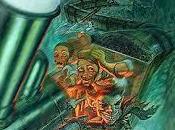 Su Language Log si parla del DSM-5, la quinta edizione del Diagnostic and Statistical Manual of Mental Disorders,ovvero il manuale di riferimento per i disturbi mentali più usato da medici, psichiatri e psicologi di tutto il mondo, che verrà pubblicato nel maggio 2013.
Su Language Log si parla del DSM-5, la quinta edizione del Diagnostic and Statistical Manual of Mental Disorders,ovvero il manuale di riferimento per i disturbi mentali più usato da medici, psichiatri e psicologi di tutto il mondo, che verrà pubblicato nel maggio 2013.A quanto pare, l'autorevole tomo conterrà finalmente una definizione clinica dei capricci di vostro figlio. Anzi, due.
Se il bambino tende a dire spesso di no, magari ad alta voce, e magari pestando i piedi, potrebbe soffrire di Oppositional Defiant Disorder. Ne parla diffusamente il sito della American Academy of Child and Adolescent Psichiatry, che raccomanda: "Treatment of ODD may include: Parent Management Training Programs to help parents and others manage the child’s behavior. Individual Psychotherapy to develop more effective anger management. Family Psychotherapy to improve communication and mutual understanding. Cognitive Problem-Solving Skills Training and Therapies to assist with problem solving and decrease negativity. Social Skills Training to increase flexibility and improve social skills and frustration tolerance with peers."E naturalmente aggiunge: "Medication may be helpful in controlling some of the more distressing symptoms of ODD as well as the symptoms related to coexistent conditions such as ADHD, anxiety and mood disorders."I vostri figli potrebbero però soffrire di un altro disturbo, il Disruptive Mood Disregulation Disorder, o disregolazione turbolenta dell'umore, detta anche "capricci", per il quale naturalmente esistono delle terapie e dei medicinali ad hoc.Ma altri inquietanti disturbi mentali sono elencati nell'illustre manuale: tutti noi potremmo soffrire di Internet addiction, naturalmente, ma anche di Gambling Disorder o Hypersexual Disorder. E mentre anche la timidezza e la tristezza potrebbero diventare ufficialmente disturbi curabili farmacologicamente, ancora più preoccupanti sarebbero - secondo l'Independent - gli "attempts to redefine crimes as illnesses, such as 'paraphilic coercive disorder', applied to men engaged in sexual relationships involving the use of force. They are more commonly known as rapists."
L'opposizione a queste novità è molto forte, e più di undicimila professionisti della psichiatria hanno firmato una petizione per chiedere la revisione del manuale. Come sostiene Peter Kinderman, direttore del Liverpool University's Institute of Psychology: "Many people who are shy, bereaved, eccentric, or have unconventional romantic lives will suddenly find themselves labeled as mentally ill."Una rassegna stampa molto esauriente potete trovarla QUI.






